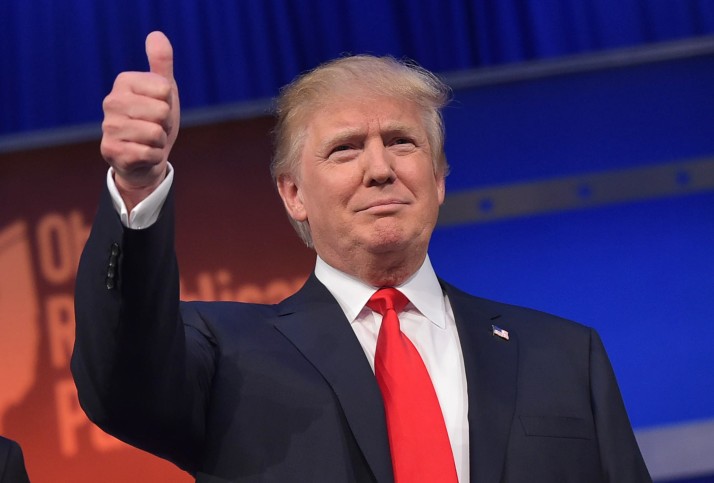…Is the most common April Fools joke I am seeing in my Facebook and Twitter feed. We really did all wake up with the same idea this morning.
The thing is, somebody really does need to start advising him. The transcripts of his foreign policy discussions and Washington Post and New York Times have to be read to be believed. The simplest and probably correct reading is that he has not spent much time thinking about the issues, in part because it’s not a serious primary issue, and so is making it up as he goes along. In the absence of any advisors, it’s actually a very effective way to float and get feedback on policy ideas, especially if you have no compunction about doing the opposite of what you said later on. It’s the gift of a populist too.
Meanwhile, the American Politics faculty at Columbia ran a panel for other faculty yesterday on what we’ve learned about politics from Trump and what we haven’t. Many interesting things were said. A sampling:
- For all the talk of the party not getting behind Trump as the nominated candidate, it’s important to remember that this hasn’t happened in a century. Anything is possible, but both parties have unified behind polarizing figures in the past. Therefore you can expect some serious foreign policy advisers to jump on soon.
- History also suggests that, in the general election, a candidate’s ability and character matter less than the party affiliation and current conditions. That is, it might be more accurate to think about the general election as a referendum on the Obama administration that a vote for (or against) Clinton or Trump.
- Primary rhetoric is partly emotion and partly an act. The politicians know this. A lot of the public knows this. And divides that seem impossible to bridge often have bridges six months later.
- If you looked at the breadth of candidates at the outset, it wasn’t hard to predict that the Republican primary would go to the convention. But no one would have predicted it would be these three.
- Looking back, you can understand Trump as having some advantages in this kind of crowded field: a gift for capturing the mood of the people, a guy who can think on his feet.
- Also, while there have always been voters with a degree of intolerance, and a taste for the authoritarian, historically they have been spread across both parties. But that distribution has changed in recent years. You no longer have many conservative Democrats or liberal Republicans, in Congress or the voter ranks. So that raises the support base for their kind of candidate.
My reading is that the political scientists haven’t decided to change their theories yet, so much as they have updated their beliefs about some features of the American public. You cannot fit a theory to a single case, and a single unusual result doesn’t and shouldn’t upend theories of how politics works.
Another way you might say this is that “Trump is in the error term.” That to me is the most plausible explanation.


21 Responses
Looking back, you can understand Trump as having some advantages in this kind of crowded field: a gift for capturing the mood of the people, a guy who can think on his feet.
golu dolls
golu dolls
Columbia U panel on Trump summary offered by @cblatts – “Trump is in the error term.” https://t.co/hhyOG6rUZR
Thrilled to announce I’ll be joining the Trump campaign to advise on development and humanitarian assistance…:… https://t.co/hAJVtKq8xe
Lessons from pol sci about trump https://t.co/D8hRbWXgyP #ciênciapolítica
Points raised by the American Politics faculty at Columbia (thx to @cblatts) https://t.co/ghzDL1ewPQ https://t.co/Lzr2YTKuXT
RT @cblatts: Thrilled to announce I’ll be joining the Trump campaign to advise on international policy! Read more: https://t.co/VwqGdlPGLO
RT @cblatts: Thrilled to announce I’ll be joining the Trump campaign to advise on international policy! Read more: https://t.co/VwqGdlPGLO
Thrilled to announce I’ll be joining the Trump campaign – @cblatts https://t.co/ITz8uRB6la
” somebody really does need to start advising him”…
This one of those “You can explain it to him, but you can’t understand it for him” situations.
RT @cblatts: Thrilled to announce I’ll be joining the Trump campaign to advise on international policy! Read more: https://t.co/VwqGdlPGLO
If there is any election that doesn’t follow what what history suggests (your second bullet) I think it will be this one.
RT @cblatts: Thrilled to announce I’ll be joining the Trump campaign to advise on international policy! Read more: https://t.co/VwqGdlPGLO
RT @cblatts: Thrilled to announce I’ll be joining the Trump campaign to advise on international policy! Read more: https://t.co/VwqGdlPGLO
RT @cblatts: Thrilled to announce I’ll be joining the Trump campaign to advise on international policy! Read more: https://t.co/VwqGdlPGLO
RT @cblatts: Thrilled to announce I’ll be joining the Trump campaign to advise on international policy! Read more: https://t.co/VwqGdlPGLO
RT @cblatts: Thrilled to announce I’ll be joining the Trump campaign to advise on international policy! Read more: https://t.co/VwqGdlPGLO
RT @cblatts: Thrilled to announce I’ll be joining the Trump campaign to advise on international policy! Read more: https://t.co/VwqGdlPGLO
RT @cblatts: Thrilled to announce I’ll be joining the Trump campaign to advise on international policy! Read more: https://t.co/VwqGdlPGLO
@cblatts I almost unfollow you for that hehehe :)
RT @cblatts: Thrilled to announce I’ll be joining the Trump campaign to advise on international policy! Read more: https://t.co/VwqGdlPGLO
@cblatts ugh. Google has officially killed April fools, you did get the memo? Reminder: officially is now officially the new literally.